Google to launch censored search engine in China
US tech giants have been trying to break the world’s biggest internet market for years

A free daily email with the biggest news stories of the day – and the best features from TheWeek.com
You are now subscribed
Your newsletter sign-up was successful
Google is planning to launch a censored version of its search engine for China that will block websites and search terms about human rights, democracy, religion, and peaceful protest.
Citing internal Google documents and people familiar with the plans, The Intercept reports that the project – code-named Dragonfly – has been underway since spring of last year, and accelerated following a December 2017 meeting between Google’s chief executive Sundar Pichai and a top Chinese government official.
The Intercept says the move “represents a dramatic shift in Google’s policy on China” and will mark the first time in almost a decade that it has operated its search engine in the country.
The Week
Escape your echo chamber. Get the facts behind the news, plus analysis from multiple perspectives.

Sign up for The Week's Free Newsletters
From our morning news briefing to a weekly Good News Newsletter, get the best of The Week delivered directly to your inbox.
From our morning news briefing to a weekly Good News Newsletter, get the best of The Week delivered directly to your inbox.
Google withdrew its service from China in 2010 amid claims the Gmail accounts of several Chinese human rights activists had been compromised.
The web is heavily censored by Beijing, with the country’s so-called Great Firewall preventing citizens from accessing many politically sensitive sites, and even references to George Orwell.
Campaigners report that censorship in the country has increased under President Xi Jinping, extending beyond the web to social media and chat apps, reports The Verge.
“The problem,” says Motherboard, “is that China is a goldmine for internet companies. The country has twice as many people online as America has citizens and apparently the temptation may be too much to resist for Google”.
A free daily email with the biggest news stories of the day – and the best features from TheWeek.com
Under the new agreement, Google could roll-out its new censored search engine through a Chinese android app within six months. The product would reportedly block Western services already outlawed in China, including Facebook, Twitter, Instagram, and even Wikipedia, and also scrub results for sensitive terms, such as the Tiananmen Square massacre, and international media including the BBC and The New York Times.
One Google employee who worked on Dragonfly told the Intercept: “I’m against large companies and governments collaborating in the oppression of their people, and feel like transparency around what’s being done is in the public interest.”
Warning it could set a dangerous precedent, the employee added: “What is done in China will become a template for many other nations.”
-
 What to know before filing your own taxes for the first time
What to know before filing your own taxes for the first timethe explainer Tackle this financial milestone with confidence
-
 The biggest box office flops of the 21st century
The biggest box office flops of the 21st centuryin depth Unnecessary remakes and turgid, expensive CGI-fests highlight this list of these most notorious box-office losers
-
 What are the best investments for beginners?
What are the best investments for beginners?The Explainer Stocks and ETFs and bonds, oh my
-
 Will AI kill the smartphone?
Will AI kill the smartphone?In The Spotlight OpenAI and Meta want to unseat the ‘Lennon and McCartney’ of the gadget era
-
 Has Google burst the Nvidia bubble?
Has Google burst the Nvidia bubble?Today’s Big Question The world’s most valuable company faces a challenge from Google, as companies eye up ‘more specialised’ and ‘less power-hungry’ alternatives
-
 How the online world relies on AWS cloud servers
How the online world relies on AWS cloud serversThe Explainer Chaos caused by Monday’s online outage shows that ‘when AWS sneezes, half the internet catches the flu’
-
 Is the UK government getting too close to Big Tech?
Is the UK government getting too close to Big Tech?Today’s Big Question US-UK tech pact, supported by Nvidia and OpenAI, is part of Silicon Valley drive to ‘lock in’ American AI with US allies
-
 Google: A monopoly past its prime?
Google: A monopoly past its prime?Feature Google’s antitrust case ends with a slap on the wrist as courts struggle to keep up with the tech industry’s rapid changes
-
 South Korea's divide over allowing Google Maps
South Korea's divide over allowing Google MapsTalking Points The country is one of few modern democracies where the app doesn't work
-
 Google avoids the worst in antitrust ruling
Google avoids the worst in antitrust rulingSpeed Read A federal judge rejected the government's request to break up Google
-
 Is AI killing the internet?
Is AI killing the internet?Talking Point AI-powered browsers and search engines are threatening the death of the open web